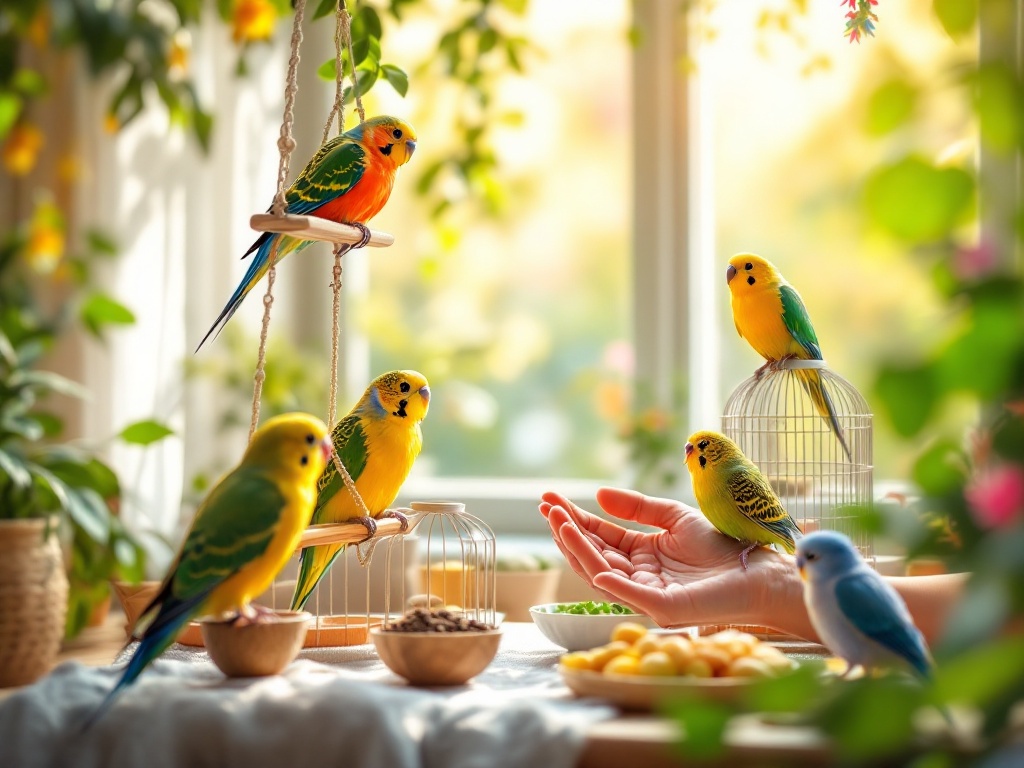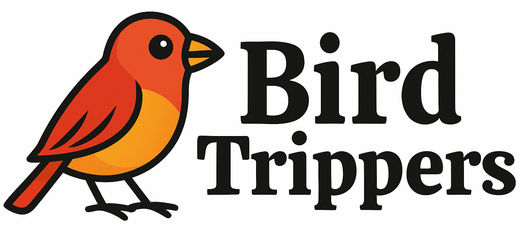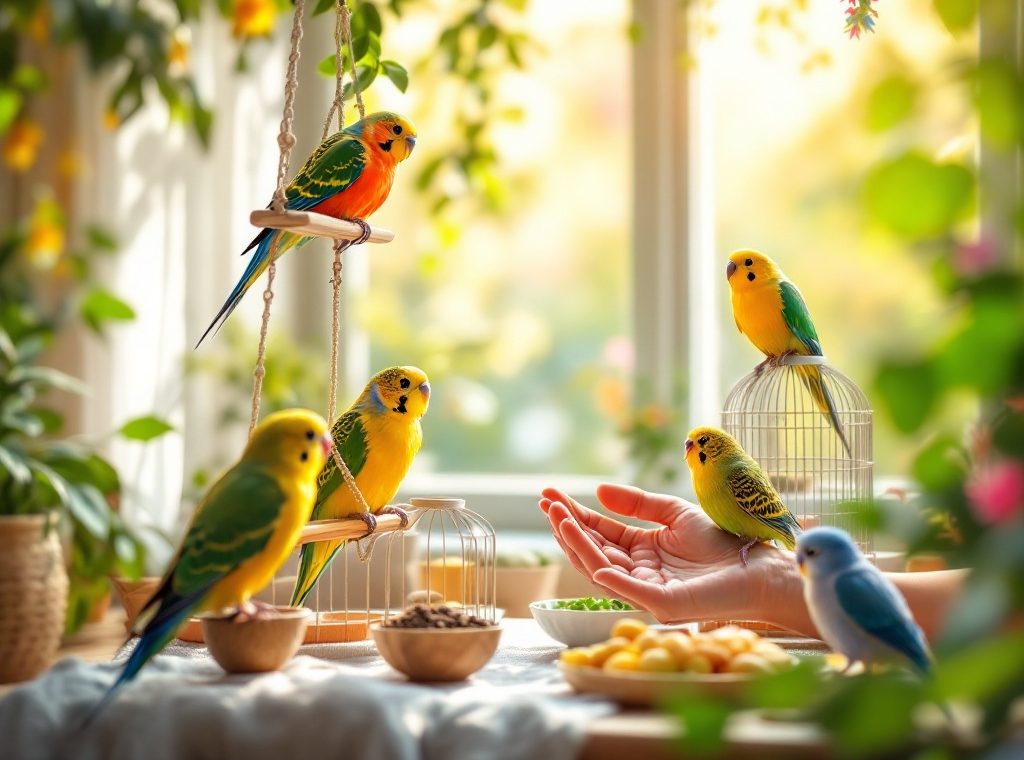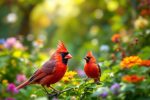Best Pet Birds for Beginners: A Short List
Dreaming of a feathered friend? Discover the perfect pet bird for your lifestyle! From playful parakeets to melodic canaries, this guide explores popular beginner-friendly species, highlighting their unique traits and care needs. Learn about essential factors like lifespan, cage setup, nutrition, and training to ensure a happy, healthy life for your avian companion. Start your journey towards bird ownership now!
Important information

- Good beginner birds include parakeets, cockatiels, lovebirds, canaries, doves, and green-cheeked conures.
- Research a bird’s needs (size, temperament, lifespan, social needs) before getting one.
- Birds need daily care: feeding, cleaning, social interaction, and enrichment.
- Regular vet checkups are important, plus monitor droppings, weight, eating, and behavior.
- Proper nutrition (pellets, seeds, fruits, veggies) and a large cage are key for health and happiness.
Popular Pet Birds for Beginners
Several wonderful bird species are perfect for first-time owners. Popular choices include parakeets (budgerigars), cockatiels, lovebirds, canaries, doves, and green-cheeked conures. These friendly birds are relatively easy to care for and adapt well to home environments, making them ideal starter pets. However, it’s important to consider factors like size, temperament, lifespan, and care requirements before choosing a feathered friend. For instance, lovebirds require significant attention and social interaction, unlike some other beginner birds. Thorough research is crucial to ensure your lifestyle complements your chosen bird’s social needs. While some birds thrive in pairs or groups, others are content living solo.
Parakeets (Budgerigars)
Parakeets, also known as budgerigars, are an excellent choice for first-time bird owners. These small, sociable birds are easy to care for, making them ideal companions. Playful and intelligent, parakeets can learn tricks, mimicking sounds and even words. Their compact size makes them perfect for apartment living, and they’re more economical to keep than larger parrots. Owning a parakeet is a truly rewarding experience. Here are some key benefits of owning a parakeet:
- Easy to care for: parakeets require minimal care compared to larger parrots, making them perfect for beginners,
- Sociable and playful: these birds thrive on interaction and enjoy playing with toys, providing hours of entertainment,
- Intelligent and trainable: parakeets can be taught tricks and can even learn to mimic sounds and words,
- Compact size: their small size makes them ideal for apartment living and easy to accommodate,
- Economical: parakeets are less expensive to feed and house than larger parrots.
Cockatiels
Cockatiels are
Lovebirds
Lovebirds are small, affectionate parrots known for their strong pair bonds. These playful and social birds thrive on attention and require more interaction than some other pet bird species, making them rewarding but demanding companions. A potential owner should carefully consider a lovebird’s social needs and the time commitment involved before bringing one home.
Canaries
Canaries are delightful singers, making them easy-to-care-for pets ideal for beginners. These cheerful birds thrive in a roomy cage and require a balanced diet of seeds, fruits, and vegetables, supplemented by fresh water. Enrichment with toys and regular cage cleaning are also essential for their well-being.
- Provide a roomy cage.
- Offer a balanced diet of seeds, fruits, and vegetables.
- Ensure a constant supply of fresh water.
- Enrich their environment with toys.
- Clean the cage regularly.
Doves
Doves are gentle birds, ideal for busy individuals. Their care is less demanding than other pet birds, making them a great choice for those with limited time. Despite their low-maintenance nature, doves still require regular attention.
Care Instructions
- Provide fresh food and water daily.
- Clean the cage regularly.
Benefits of Dove Ownership
- Calming companions.
- Relatively low maintenance.
- A wonderful addition to any home.
Green-Cheeked Conures
Green-cheeked conures are playful, intelligent birds that make engaging companions.
Characteristics of Beginner-Friendly Birds
Ready to welcome a bird into your life? Beginner-friendly species are a fantastic starting point, renowned for their sociable nature and ability to bond closely with human companions. Many are clever enough to learn tricks, including mimicking sounds. Their care is generally straightforward, although each species has specific requirements. Popular choices like parakeets, cockatiels, and canaries each offer unique personalities and needs. Thorough research is essential before choosing your new feathered friend to ensure a harmonious and rewarding relationship.
Friendly and Social Creatures
Cockatiels and parakeets are excellent choices for novice bird owners, thanks to their sociable and friendly natures. Lovebirds, while also wonderful companions, are especially known for their deep affection and thrive on close interaction with their human companions.
Intelligent and Trainable
Cockatiels and canaries are intelligent birds capable of being trained, making them excellent companions and strengthening the bond with their owners.
Low-Maintenance Companions
Doves and canaries are low-maintenance pet birds, requiring less attention than many other birds. A clean cage, fresh food, and water are vital for their health and well-being. This ease of care makes them an excellent choice for busy individuals.
Lifespan and Commitment of Pet Birds
Avian lifespans vary significantly depending on the species. Small birds like finches and canaries typically live for 5 to 10 years, while budgies, cockatiels, and lovebirds can live for 10 to 20 years. Larger parrots, such as Amazons and macaws, have considerably longer lifespans, often reaching 50 to 80 years or more. Owning a bird, especially a larger parrot, requires a substantial long-term commitment.
Daily Care
- feeding,
- cleaning,
- social interaction.
Responsibilities
- veterinary care,
- specialized diets,
- appropriate housing.
Consider potential life changes, such as moving or having children, as these can affect your ability to provide consistent care.
Choosing the Right Pet Bird for You
Choosing a feathered friend requires careful consideration. Larger birds need more space and attention than smaller ones. Temperament also varies; some birds crave interaction, while others prefer solitude. Lifespan is another factor, as some species live for decades.
Things to Consider Before Getting a Bird
- Lifestyle and Available Time: reflect on your lifestyle and available time.
- Species Research: thorough research on each species is crucial, focusing on diet, potential health issues, and environmental needs.
- Living Space and Noise Tolerance: evaluate your living space and noise tolerance, as birds can be messy.
Finding the Right Bird for You
- Personal Preferences: do you desire a cuddly companion or a more independent pet?
- Species Research: research various species to find the perfect fit for your lifestyle and existing pets, if any.
- Consider Adoption: adoption is a wonderful choice; consider rescuing a bird in need of a loving home.
Assessing Your Lifestyle and Time Commitment
Do you have enough free time for a bird? Consider if your lifestyle truly accommodates a feathered friend. Birds require daily attention, including social interaction, feeding, cage maintenance, and training. These responsibilities demand a considerable time investment.
Pet Bird Adoption Considerations
Bringing a feathered friend into your home is a significant choice. Consider these important factors before making your decision:
Size and Space
Larger birds need more space and attention than smaller birds. Evaluate the space you have available and choose a bird whose size is appropriate for your home.
Lifestyle and Experience
Consider your lifestyle and experience level. If you have a busy schedule or are a first-time bird owner, a smaller, less demanding bird may be a better fit.
Temperament
A bird’s temperament is crucial. Some birds crave constant companionship, while others prefer solitude. Choose a bird whose personality complements your lifestyle.
Species Research
Before bringing a bird home, research the specific species thoroughly. Understand their dietary needs, including the right mix of seeds, pellets, fruits, and vegetables.
Health and Habitat
Learn about potential health concerns specific to the species. Create a spacious habitat with plenty of perches and toys to keep your bird mentally and physically stimulated.
Interaction
Interaction is essential for these social creatures. Be prepared to provide regular interaction and mental stimulation to ensure your bird’s happiness and well-being.
Bird Care Essentials for Beginners
Welcoming a feathered friend into your home is exciting, but new bird owners should understand their pet’s core needs. Nutrition is paramount, and a balanced diet is key to a healthy bird. This means offering a mix of pellets, seeds, fresh fruits, and vegetables. While seeds can be a tasty treat, pellets should form the foundation of their nutrition, providing essential vitamins and minerals. Fresh, clean water should always be readily available.
Nutrition
- Offer a mix of pellets, seeds, fresh fruits, and vegetables.
- Pellets should be the foundation of their diet, providing essential vitamins and minerals.
- Always provide fresh, clean water.
Environment
- Provide a spacious cage for movement and exercise.
- Enrich the cage with perches and toys for mental stimulation.
- Regularly clean the cage to prevent illness.
Just like other pets, birds benefit from regular veterinary care. Schedule check-ups to ensure your bird stays in top shape and to catch any potential health issues early. Be observant of your bird’s behavior and appearance, noting any changes that might warrant a vet visit. Regular grooming, including nail trims and feather care, contributes to their overall health and comfort.
Prioritize social interaction. Birds are social creatures that thrive on interaction.
Engage in daily bonding and playtime for their emotional well-being.
Create a safe, enriching, and interactive environment.
Feeding and Nutrition
A balanced diet is crucial for a pet bird’s health and happiness. It includes a variety of foods like seeds and pellets, along with fresh fruits and vegetables. Each species has unique dietary needs. A parrot’s diet, for instance, won’t be the same as a canary’s. Consult an avian veterinarian for personalized recommendations tailored to your feathered companion.
Cage Requirements and Setup
Your bird’s cage size directly impacts their happiness. Small birds, such as budgies and finches, thrive in cages at least 18x18x24 inches. Horizontal bars are essential for climbing and exercise.
- Furnish the cage with perches, toys, and food and water dishes to create a stimulating environment, promoting their well-being.
- A spacious cage contributes significantly to a happier, healthier bird.
Larger birds, such as cockatiels, need even more room. Ideally 24x24x36 inches or larger, allowing them to fully extend their wings.
Veterinary Care and Health Monitoring
Regular veterinary checkups are essential for maintaining your pet bird’s well-being. Avian veterinarians, specializing in bird health, can detect and address illnesses early on. These checkups typically involve physical examinations, blood work, and fecal analysis to ensure your bird remains healthy. Owners should also monitor their bird’s droppings, weight, eating habits, and behavior for any changes, as these can be early indicators of a problem. Finally, quarantining new birds before introducing them to your existing flock is crucial for preventing disease transmission and protecting your feathered companions. Here’s a step-by-step guide for responsible bird ownership:
Schedule regular checkups with an avian veterinarian. These specialists are equipped to diagnose and treat bird-specific illnesses.
Monitor your bird’s health at home. Observe their droppings, weight, eating habits, and behavior for any deviations from the norm.
Quarantine new birds. Before introducing new birds to your flock, isolate them for a period to prevent the spread of potential diseases.
Social Interaction and Enrichment
Enrichment and interaction are crucial for pet bird well-being. Engaging your bird in play, training, and gentle handling is essential for their happiness.
Why is stimulation so important?
Birds are intelligent creatures that need mental stimulation to prevent boredom and behavioral issues such as feather plucking and excessive screaming.
How to keep your bird entertained
- Provide toys and puzzles.
- Create foraging opportunities.
- Interact regularly through play and training.
Training and Interaction with Your Pet Bird
Start by teaching your bird to target a dowel or stick. Use a clicker to mark the desired action and immediately give a reward. This clicker training method effectively connects actions to positive outcomes.
Teach your bird to step up on command. Use the dowel or stick as a perch and reward your feathered friend for stepping onto it.
Introduce recall training. This will enable your bird to fly to you when called, strengthening your bond and ensuring its safety.
To encourage talking, frequent interaction and positive reinforcement are essential. Engage your bird in regular conversation, repeating words and phrases you want it to learn. Toys and games can also stimulate vocalizations and mental engagement.
While some species, like parakeets, cockatiels, and certain Amazon parrots, are more predisposed to talking, playing recordings of human speech or bird songs can be beneficial for any bird, fostering a stimulating auditory environment.
Basic Training Techniques
Start with short training sessions, rewarding your pet with treats and praise.
Use clear, consistent commands.
Clicker training is a fun and effective method for teaching tricks.
Target training simplifies bringing your pet into its cage and improves recall.
Encouraging Vocalization in Talking Birds
Frequent interaction is crucial for encouraging vocalizations. Positive reinforcement, such as treats and praise, motivates your bird. Cockatiels, renowned for their talking abilities, respond especially well to this positive feedback.


















